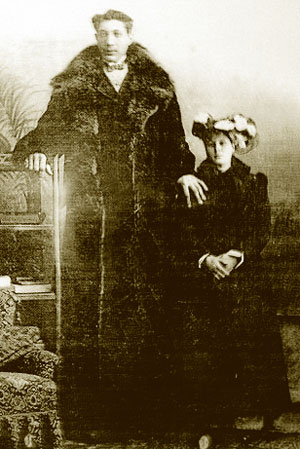Feodor Machnow
Feodor Machnow was a figure of considerable interest in the early 20th century, known for his extraordinary height. While specific details about his life, including his birth and death dates, remain somewhat obscure, Machnow was often referred to as the "Russian Giant" due to his nationality and remarkable stature. His height was reported to vary in accounts, but he was often said to stand at over 8 feet tall. Machnow's life and the fascination surrounding it reflect the human interest in physical anomalies and the ways in which they have been historically documented and sometimes exploited.
Early Life[edit | edit source]
The early life of Feodor Machnow is shrouded in mystery, with little reliable documentation available. He was born in Russia, and it is believed that his extraordinary growth began from a young age. The lack of medical understanding at the time meant that the reasons for his height were not well explained, though today it might be attributed to conditions such as gigantism or acromegaly, which result from an overproduction of growth hormone.
Career[edit | edit source]
Feodor Machnow's height made him a subject of public interest, and he was often exhibited in circuses and freak shows across Europe. These shows were a common form of entertainment in the 19th and early 20th centuries, where people with physical anomalies were often displayed for the curiosity and amusement of the audience. Machnow's appearances were well-attended, and he became something of a celebrity in his time, with various promotional materials exaggerating his height and the spectacle of his size.
Legacy[edit | edit source]
The legacy of Feodor Machnow is complex. On one hand, his life story provides insight into the social and cultural attitudes towards physical differences and the exploitation of individuals for entertainment purposes. On the other hand, his existence challenges the medical and scientific understanding of human growth and its anomalies. Today, Machnow's story is often cited in discussions about the ethics of freak shows and the treatment of individuals with physical differences.
See Also[edit | edit source]
Search WikiMD
Ad.Tired of being Overweight? Try W8MD's physician weight loss program.
Semaglutide (Ozempic / Wegovy and Tirzepatide (Mounjaro / Zepbound) available.
Advertise on WikiMD
|
WikiMD's Wellness Encyclopedia |
| Let Food Be Thy Medicine Medicine Thy Food - Hippocrates |
Translate this page: - East Asian
中文,
日本,
한국어,
South Asian
हिन्दी,
தமிழ்,
తెలుగు,
Urdu,
ಕನ್ನಡ,
Southeast Asian
Indonesian,
Vietnamese,
Thai,
မြန်မာဘာသာ,
বাংলা
European
español,
Deutsch,
français,
Greek,
português do Brasil,
polski,
română,
русский,
Nederlands,
norsk,
svenska,
suomi,
Italian
Middle Eastern & African
عربى,
Turkish,
Persian,
Hebrew,
Afrikaans,
isiZulu,
Kiswahili,
Other
Bulgarian,
Hungarian,
Czech,
Swedish,
മലയാളം,
मराठी,
ਪੰਜਾਬੀ,
ગુજરાતી,
Portuguese,
Ukrainian
Medical Disclaimer: WikiMD is not a substitute for professional medical advice. The information on WikiMD is provided as an information resource only, may be incorrect, outdated or misleading, and is not to be used or relied on for any diagnostic or treatment purposes. Please consult your health care provider before making any healthcare decisions or for guidance about a specific medical condition. WikiMD expressly disclaims responsibility, and shall have no liability, for any damages, loss, injury, or liability whatsoever suffered as a result of your reliance on the information contained in this site. By visiting this site you agree to the foregoing terms and conditions, which may from time to time be changed or supplemented by WikiMD. If you do not agree to the foregoing terms and conditions, you should not enter or use this site. See full disclaimer.
Credits:Most images are courtesy of Wikimedia commons, and templates, categories Wikipedia, licensed under CC BY SA or similar.
Contributors: Prab R. Tumpati, MD

